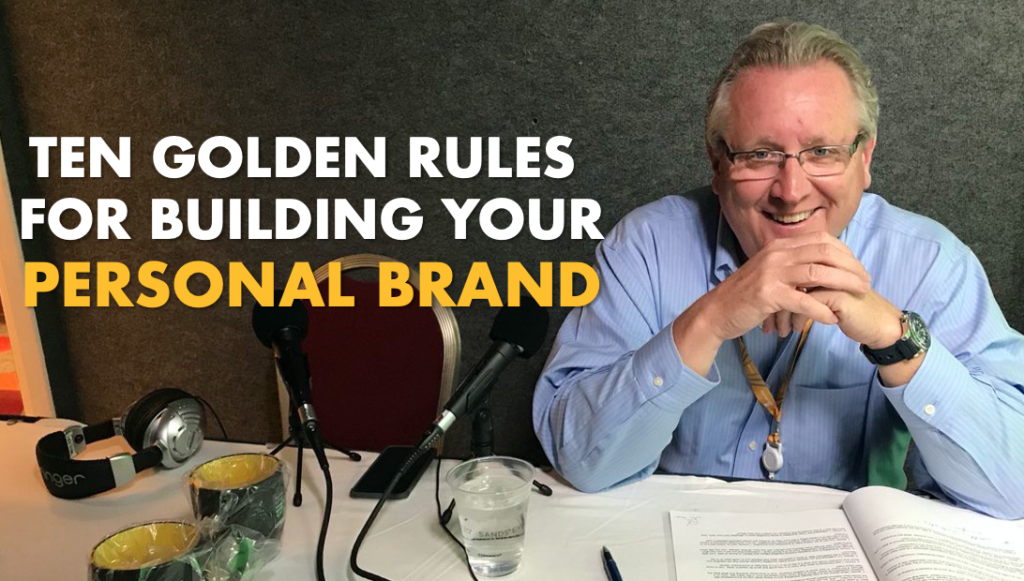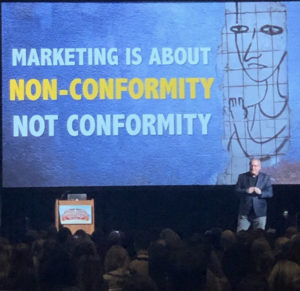
Since I wrote my book “KNOWN” a few years ago, I’ve continued to immerse myself in the best practices of … well, becoming known! We are in a period of business turmoil and marketing revolution. It’s more important than ever to mindfully, systematically, and urgently master the best practices and rules of personal branding.
I’m doing a ton of personal coaching right now with people who want to stand out in their field. There are certain themes I keep coming back to and I thought I would summarize some of those big ideas for you today.
Here are my 10 Golden Rules of Personal Branding:
1. Be clear on what you want to be known for.
This is the necessary first step and maybe the most difficult of the golden rules of personal branding
It’s important to separate your “passion” from a sustainable interest that is meaningful to an audience big enough to make your dreams come true. Sometimes that passion and sustainable interest overlap, but sometimes a passion should be a hobby, not a career.
Another thing people struggle with is actually choosing which path to follow if they have diverse interests. In my coaching, I’ve learned there is always a common thread holding these activities together, and that is a clue to where they need to land.
Choosing your path does not have to be perfect but it should at least be heading in the right direction. You will continue to learn and evolve throughout your journey.
2. Commit.
I wish I could have written a book called “30 Days to a Powerful Personal Brand.” But that would be a lie.
There’s simply no shortcut. In my coaching, I want to make certain that a person is willing to commit to 18 months of consistent effort, and that usually involves at least two hours per week.
This might seem like a lot of effort, but you should look at this work as a deposit in an insurance policy for your career and the long-term. My business crashed during the pandemic. I was literally saved by the work I did on my personal brand.
3. Everything becomes part of your brand.
I chuckle every time I see this caveat on a Twitter bio: “Tweets are my own and do not reflect the policies of my company.”
Everything is connected. You’re only one person. The fact is that whether you are at work, at home, in a bar, at a conference, or partying in Cozumel, you’re ON. Your personal brand is the accumulated impression you leave on people.
So, if you post photos of you skinny dipping at night, that becomes part of the impression. There are no secrets any more. Everything you do, and everything you don’t do, becomes part of your brand.
 4. Be a non-conformist.
4. Be a non-conformist.
Great marketing is not about conformity, It’s about non-conformity.
This is a big problem I see in the world today. Everybody just copies each other, spilling out the same old tips and tricks. It’s mind-numbing. The social media space in particular has never been so boring the last few years.
To stand out, you need to zig when others are zagging. Even in a crowded space, there are so many ways to do something different! Don’t settle for average.
5. Choose a content form carefully.
Content fuels the personal brand and the type of content you produce is a HUGE decision. The main consideration is that it has to be something you LOVE because if you don’t love it, you’ll quit and you can’t quit.
Some personal branding consultants recommend that you do everything — blogs, videos, podcasts, streaming, and so on. I disagree. To stand out, you have to be great, and you can’t be great in 10 different places. Focus on being great in one place, not ubiquitous.
6. Add your own story.
Which YouTube video would you rather watch?
- The five biggest Twitter mistakes
- How Twitter saved my marriage
I’m pretty sure you chose the second one! Why? Because ANYONE could create the first video. But only one person in the world can create that second one. It’s compelling, provocative, and personal.
To stand out, you need to have the courage to add your own personal story to your narrative.
To rise above the noise, you have to be original. And to be original, you have just one choise. Be you. By definition, that’s original.
7. Consistency is more important than genius.
To become known, you want to become a habit. To become a habit, your audience should expect to get something great from you on a regular basis.
One of the highest compliments I ever received was from a woman who wrote: “I start my day with you. I get a cup of coffee and see what you’ve written for me today.” That is amazing and humbling. I’ve become part of the fabric of her life. She can count on me.
If you’ve ever heard me talk about brand-building, you’re probably familiar with my emphasis on consistency. You have to show up every week, no excuses.
Everybody has the same amount of time. The point of difference between success and failure is your priorities.
8. Deliver insights, not information.
When I work with people on developing their personal brand, I can almost always determine quickly whether they can be successful, just by looking at their social media stream. Are they delivering insights or information?
Information is simply passing along content from others.
Insights are your own takes on what is going on in your industry and the world. You’re adding your view.
Those who deliver insights will win. This can certainly be a learned behavior. If you want to read more about that, I wrote this for you: Four ways to deliver insights, not just information.
9. Watch for qualitative signs of success
One of the most important parts of my KNOWN book is a section about calling it quits. How do you know your effort is working? How do you know when it’s time to pivot or quit?
The key idea is to watch for qualitative signs of success. A quantitative measure is something you can count, like money. A qualitative measure is more important in this case. That’s something like a tweet, a question that comes your way, or a story about you.
Are people asking you questions based on your content? Are they asking you to be on podcasts? Are they starting to share your work? Are you getting signs of support at your company or within your industry? These are all qualitative signs that it’s working.
As long as you see those signs, keep going. It’s working!
10. Persevere

Mini golf? Or my life?
Maybe the most important of the 10 rules of personal branding is this: Keep going!
I have this very weird image of business success. It’s like miniature golf.
In miniature golf, nothing is straightforward. There are hills, there are curves, and there are blocks sitting right in the middle of your path set there specifically to screw you up. And that’s part of the fun.
Life isn’t linear. It’s miniature golf.
Shit always happens. My mindset on those days is … OK, this effort just became more challenging, but that’s part of the game. Let’s take a deep breath and figure it out because that’s how you keep moving forward and ultimately win.
Great leaders always display resilience and grit. And that’s part of becoming a great brand, too.
I know that working on a personal brand can seem overwhelming. But it doesn’t have to be that way. Focus on the golden rules of personal branding.
A good place to start is my book KNOWN: The handbook for building and unleashing your personal brand in the digital age, the accompanying personal branding workbook, and you can always give me a call and ask for help.
 Mark Schaefer is the executive director of Schaefer Marketing Solutions. He is the author of several best-selling digital marketing books and is an acclaimed keynote speaker, college educator, and business consultant. The Marketing Companion podcast is among the top business podcasts in the world. Contact Mark to have him speak to your company event or conference soon.
Mark Schaefer is the executive director of Schaefer Marketing Solutions. He is the author of several best-selling digital marketing books and is an acclaimed keynote speaker, college educator, and business consultant. The Marketing Companion podcast is among the top business podcasts in the world. Contact Mark to have him speak to your company event or conference soon.
Follow Mark on Twitter, LinkedIn, and Instagram.
Mini golf photo courtesy Unsplash.com


